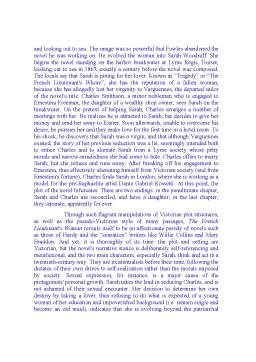Extras din seminar
The novel The French Lieutenant's Woman is almost as much about the twentieth century attitude to the Victorian age as it is about its setting. The author, John Fowles, makes much of contradictions (such as the popularity of pornography in a supposedly straitlaced culture), implicitly drawing attention to similar contradictions a hundred years later- the novel is set almost exactly a century before it was written. In science fiction, it is common to use the future to criticize the present, but it is much more unusual for a historical novel to attempt to use the past for the same purpose. Perhaps the most beloved of Fowles's internationally bestselling works, The French Lieutenant's Woman is a feat of seductive storytelling that effectively invents anew the Victorian novel. "Filled with enchanting mysteries and magically erotic possibilities", the novel inspired the hugely successful 1981 film starring Meryl Streep and Jeremy Irons and is today universally regarded as a modern classic.
The type of story told here is, with certain modifications such as overt sexuality, one which could have been the plot of a nineteenth century novel. Set in Lyme Regis (location of important parts of persuasion and, as a fossil hunter's paradise, essential to developments in Victorian scientific ideas), The French Lieutenant's Woman is about Charles Smithson, heir to a baronetcy, and the woman to whom he is engaged, Ernestina Freeman, rich heiress of a merchant. She is spending the summer with her aunt, a resident of the town. The woman of the title is a former governess who haunts the quay after having been abandoned by her lover, a French sailor; respectable people assume that she is no better than a prostitute. The composition of The French Lieutenant's Woman began suddenly in 1967 when John Fowles, then already the author of two best-sellers, The Collector (1963) and The Magus (1966), was working on another novel. Fowles found that his imagination was haunted by the recurring image of a mysterious woman standing on the end of a quay and looking out to sea. The image was so powerful that Fowles abandoned the novel he was working on. He evolved the woman into Sarah Woodruff. She begins the novel standing on the harbor breakwater at Lyme Regis, Dorset, looking out to sea in 1867, exactly a century before the novel was composed. The locals say that Sarah is pining for her lover. Known as Tragedy or The French Lieutenant's Whore , she has the reputation of a fallen woman, because she has allegedly lost her virginity to Varguennes, the departed sailor of the novel's title. Charles Smithson, a minor nobleman who is engaged to Ernestina Freeman, the daughter of a wealthy shop owner, sees Sarah on the breakwater. On the pretext of helping Sarah, Charles arranges a number of meetings with her. He realizes he is attracted to Sarah, but decides to give her money and send her away to Exeter. Soon afterwards, unable to overcome his desire, he pursues her and they make love for the first time in a hotel room. To his shock, he discovers that Sarah was a virgin, and that although Varguennes existed, the story of her previous seduction was a lie, seemingly intended both to entice Charles and to alienate Sarah from a Lyme society whose petty morals and narrow-mindedness she had come to hate. Charles offers to marry Sarah, but she refuses and runs away. After breaking off his engagement to Ernestina, thus effectively alienating himself from Victorian society (and from Ernestina's fortune), Charles finds Sarah in London, where she is working as a model for the pre-Raphaelite artist Dante Gabriel Rossetti. At this point, the plot of the novel bifurcates. There are two endings: in the penultimate chapter, Sarah and Charles are reconciled, and have a daughter; in the last chapter, they separate, apparently for ever.
Through such flagrant manipulations of Victorian plot structures, as well as the pseudo-Victorian style of many passages, The French Lieutenant's Woman reveals itself to be an affectionate parody of novels such as those of Hardy and the sensation writers like Willie Collins and Mary Braddon. And yet, it is thoroughly of its time: the plot and setting are Victorian, but the novel's narrative stance is deliberately self-referencing and metafictional, and the two main characters, especially Sarah, think and act in a twentieth-century way. They are existentialists before their time, following the dictates of their own drives to self-realization rather than the morals imposed by society. Sexual expression, for instance, is a major cause of the protagonists' personal growth. Sarah takes the lead in seducing Charles, and is not ashamed of their sexual encounter. Her decision to determine her own destiny by taking a lover, thus refusing to do what is expected of a young woman of her education and impoverished background (i.e. remain single and become an old maid), indicates that she is evolving beyond the patriarchal restraints placed on Victorian bourgeois women. Charles sees Sarah in a way in which he will never see Ernestina; she is sleeping openly in a natural position which is, not surprisingly, sexually suggestive. If the close-minded, tightly clothed Ernestina represents the Victorian marriage-and-family ideal, Sarah seems to represent the unspoken male ideal, at least for men like Charles - a natural woman, a woman of intelligence, of spirit and independence, who is not afraid to shun the ideal in favor of the real, to prefer passion to posturing. Her interactions with Charles make the "love" of Charles and Ernestina seem like the play-acting of children. Even with Sarah, however, Charles cannot escape the duality of his perceptions and desires.
Preview document
Conținut arhivă zip
- The French Lieutenant's Woman.doc















